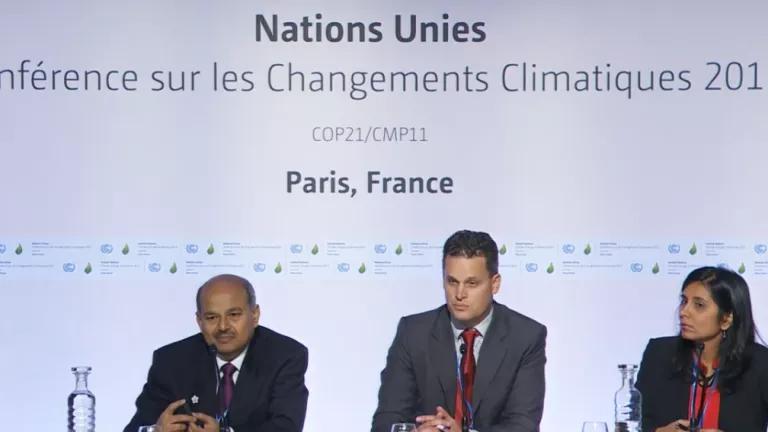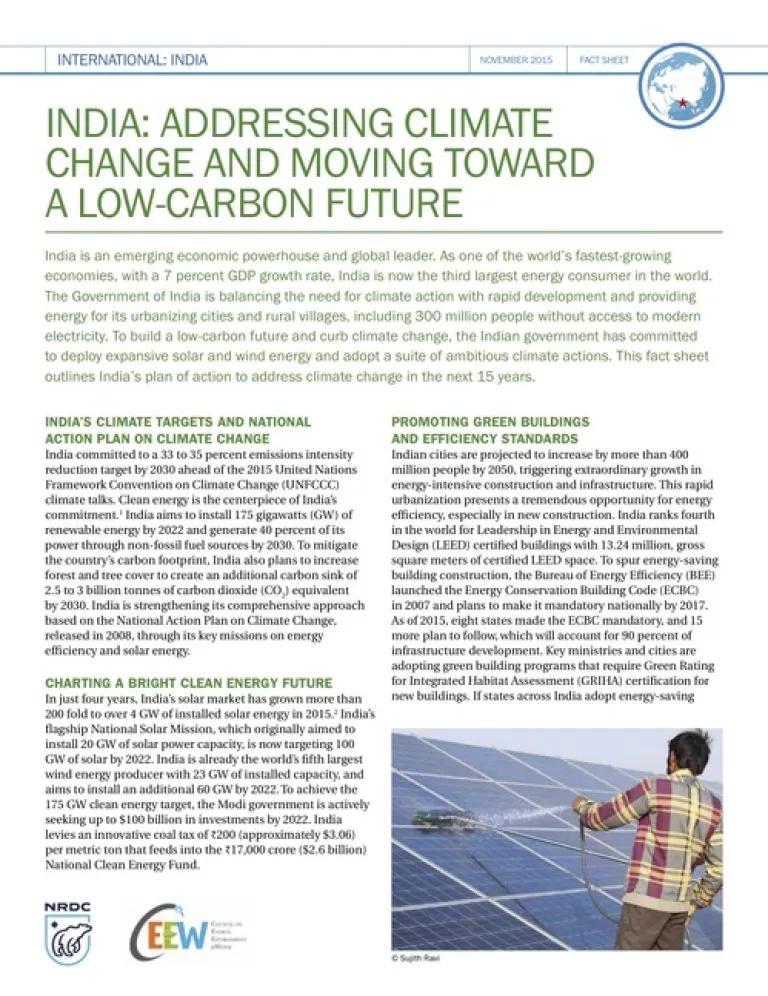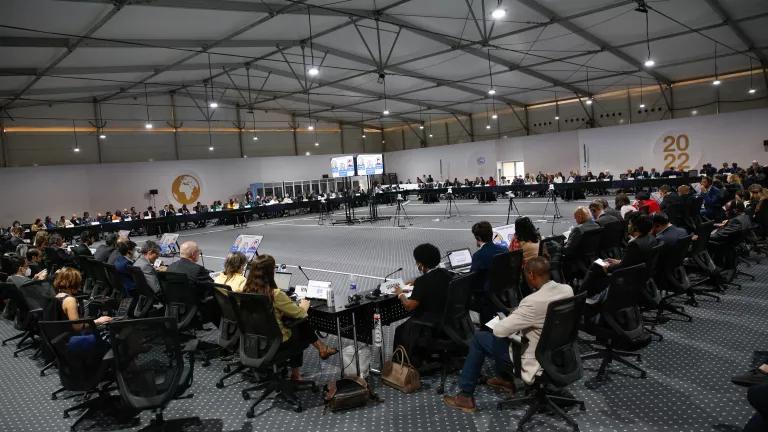
Co-authored by NRDC's Sameer Kwatra and Meredith Connolly
As the international climate negotiations in Paris reach the halfway point, India's lead negotiator Additional Secretary Susheel Kumar of the Ministry of Environment, Forests and Climate Change offered insights into India's negotiating position and approach to tackling climate change.
NRDC's Jake Schmidt and Anjali Jaiswal hosted Mr. Kumar for an interaction with the media on Friday at the climate negotiations. India's participation and leadership are critical to making international progress toward solving the climate crisis, and to achieving a successful global deal in Paris. While all eyes are on India, Mr. Kumar reiterated that India wants a progressive and durable agreement that reflects the framework principles of the convention including Equity and Common But Differentiated Responsibilities (CBDR).
Mr. Kumar underscored the arduous task India faces in bringing millions of people out of poverty and providing them with access to energy, housing, and clean drinking water, while charting an unprecedented large-scale, low carbon development paradigm. Despite these challenges, India has already taken a number of important steps towards decarbonization of its economic growth and has robust plans to do more. In the lead-up to the negotiations, India had announced a comprehensive Intended Nationally Determined Contribution (INDC) with the goal of reducing emissions intensity by 33-35% from 2005 levels by 2030, a 75% increase in ambition compared to the country's earlier 2020 pledge.

India's coal imports have declined for four consecutive months in October and Minister Piyush Goyal has recently stated that India will stop importing coal by 2017. India's ambitious renewable energy targets of 175 gigawatts (GW) by 2022 are not only a powerful means of achieving its climate commitments, but also vital for energy security. It was reported yesterday that India's solar energy capacity crossed the 5 GW mark, making it a solar leader globally. NRDC and partners are supporting financing and economic policies that enable renewable and energy efficiency to play an even bigger role in meeting the country's growing energy needs.
Mr. Kumar pointed out that with a strong commitment to ramping up solar energy, prices for new generation capacity have been falling rapidly. According to Mr. Kumar, recent power purchase agreements have priced solar energy at less than a quarter of the tariffs when the National Solar Mission was launched five years ago. As Prime Minister Modi launched the International Solar Alliance last week in Paris, India has stepped up as a catalyst to accelerate the adoption of solar energy in 120 countries in the world, which should further propel the market and make solar power even more affordable.

Anjali reiterated that India is an emerging economic powerhouse and global leader. Fueling one of the world's fastest-growing economies, with a 7 percent GDP growth rate, India is now the third largest energy consumer in the world. The Government of India is balancing the need for climate action with rapid development and providing energy for its urbanizing cities and rural villages, including 300 million people without access to modern electricity. To build a low-carbon future and curb climate change, the Indian government has committed to deploy expansive solar and wind energy and adopt a suite of ambitious climate actions. In a new fact sheet released at the event, NRDC and partner Council on Energy, Environment, and Water (CEEW) have reviewed and analyzed India's plan of action to address climate change in the next 15 years.
Climate adaptation is as important as mitigation from India's perspective because "poor people are more impacted by extreme weather," according to Mr. Kumar. India is already reeling from deadly climate catastrophes, including an ongoing 100-year flood in Chennai, which has claimed 280 lives with a forecast of more rains in the coming days. Earlier this year, India experienced one of the deadliest heat waves ever recorded. Mr. Kumar emphasized a need to better adapt to climate change by investing in agriculture, water, and other resources. Taking a cue from early warning systems such as the Heat Action Plan in Ahmedabad, other leading cities in India are now taking actions to strengthen resilience to extreme weather events.
On another technical issue under negotiation in the text, Mr Kumar explained that while India does not favor any obligation on developing countries to contribute towards climate finance, individual countries are welcome to assist other less developed states on a voluntary basis. He further emphasized that developed countries providing finance is not a donation, but an obligation under the framework of the convention.
An archived webcast of the full press briefing is available here.
NRDC's team will continue to push for a global climate agreement and provide updates throughout the climate negotiations in Paris.
Jake Schmidt is also providing daily updates here.
Upcoming NRDC India Events at COP21 in Paris
City Resilience: Real World Measures that Save Lives and Reduce Carbon
Tues., 8th Dec. at 15:00-16:30, Le Bourget Climate Generations Space, Room 9, Green Zone
Speakers: Ken Alex (State of California), Frances Beinecke (NRDC), Sam Bickersteth (CDKN), Susan Casey-Lefkowitz (NRDC), Bhaskar Deol (NRDC), Arunabha Ghosh (CEEW), Anjali Jaiswal (NRDC), Frederica Perera (Columbia University), and Shelley Poticha (NRDC)
Global Climate Action: Perspectives on Major Energy Initiatives in China, India and the United States
Thurs.,10th Dec. at 11:30-13:00, Le Bourget, Blue Zone
Speakers: Junfeng Li (NDRC-China), Ajay Mathur (Gov. of India), Rhea Suh (NRDC), Jiaman Jin (GEI), Annapurna Vancheswaran (TERI), Sonia Medina (CIFF) and Jake Schmidt (NRDC)



